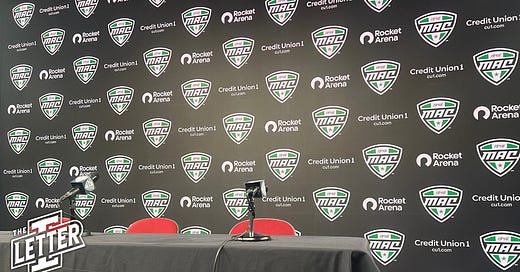Mid-American Conference: Key Takeaways from Commissioner's Meeting
Here are some of his direct quotes, along with the takeaways and implications.
March 14, 2024 - Rocket Arena - Cleveland, Ohio
Mid-American Conference commissioner Jon Steinbrecher made himself available to the media for a short 20-minute roundtable to answer questions.
Here are some of his direct quotes, along with the takeaways and implications.
On automatic bids for Power conferences:
“It seems to me that participation in the event is something earned, and it shouldn’t necessarily be slotted, but I’m open to the conversation.” Steinbrecher said.
Takeaway: Steinbrecher is skeptical of automatic bids for Power conferences in an expanded playoff, advocating instead for merit-based selection. However, he remains open to discussion on refining selection criteria.
On Revenue Sharing and the House Settlement:
“We’ve spent hours discussing how to generate revenue sources to fund this, but also the mechanical issues of how to manage it. Schools are up to their eyebrows in this process.” Steinbrecher said.
Takeaway: MAC schools are bracing for financial and logistical challenges in implementing revenue sharing for athletes, with no cap agreed upon for school contributions.
On Eddie George’s Hiring at Bowling Green:
“I like the idea of hiring a sitting head coach. Too often, we look at offensive coordinators, but a track record of leadership and program-building is invaluable.” Steinbrecher said.
Takeaway: Steinbrecher supports Bowling Green’s choice, emphasizing experience in leadership over hiring coordinators with no head coaching experience.
On the Transfer Portal and Player Mobility:
“I spent seven years working on transfer reform, and within a year, it was blown up due to antitrust concerns. Now we have student-athletes suing to play five or six years instead of four.” Steinbrecher said.
Takeaway: He acknowledges the legal complexities surrounding transfer rules, but still expresses some concern about the long-term educational impact of the transfer portal.
“We need a national NIL standard. States are competing to give their schools an edge, tweaking rules to create advantages.” Steinbrecher said.
Takeaway: He wants federal oversight of NIL to prevent states from making self-serving regulations that disrupt a competitive balance in college sports.
On NCAA Tournament Expansion:
“I don’t have fixed feelings on it. If we’re just taking the 15th-place team from a power conference, what’s the value of that?” Steinbrecher said.
Would expansion truly benefit the tournament, especially if it significantly benefits power conferences rather than mid-majors.
“If you expand the men’s tournament, you have to expand the women’s. And then there’s the logistics—flights, costs, and keeping the Final Four schedule intact.” Steinbrecher said.
He highlighted the logistical and financial hurdles of expansion, particularly the travel issues for mid-major programs.
On the Long-Term Impact of Player Movement:
“The more a young man or woman transfers, the less likely they are to graduate. Let’s put a pin in the calendar and check the graduation rates in four or five years.” Steinbrecher said.
Takeaway: Steinbrecher warned the media that increasing player mobility could negatively affect academic outcomes. He believes future evaluations will be necessary.
Steinbrecher’s responses balanced between openness to change, but skepticism about its unintended consequences. The importance of competitive fairness, financial stability, and maintaining the educational mission of college athletics amidst rapid changes are more important to the conference’s outlook.
Follow my live updates for the rest of the tournament on X, here.





